“Life in Trump’s America” is a series of essays on how the election of Trump is shaping lives, communities, and spaces.
Two days after the election, I got drinks with a Latino friend, because spending time with my people was the only thing that had sustained me. We vented about the feeling of betrayal from white women voting for Trump; we talked about the eventuality of voter suppression and the fuck-ups of the Democratic Party. But mostly, we talked about how this election had become a reminder of our supposed lesser place in America. I told him that I was once again reminded that I am not white despite my pale skin.
Proximity to whiteness will not save us, my friend told me. The goalposts measuring who gets to be white in America will continue to fluctuate, but none of it matters. “I plan on surviving in America,” he said.
Throughout the night, whenever there was a lull in our conversation or a pause of this all sinking in, one of us would repeat it back: Together, we will survive in America.
Some of this survival is basic: It means focusing on the well-being of myself and my people. I have worried for every facet of my health since the election—the family history of high blood pressure, my anxiety, my insomnia, my relationship to eating. Four years is a long time to feel hypervigilant. My people have survived far longer, and I have to keep reminding myself of that even as I bend toward dread.
Survival, in Trump’s America, is the only way forward.
Throughout the election, I was in constant contact with my father, a Chicano from New Mexico. He’s an optimist and repeatedly told me that people would do the right thing. He told me I should try to worry less. On election night, he went to bed before news broke that Hillary Clinton conceded. I left him a blubbering voicemail because I did not believe that this is my America.
“Proximity to whiteness will not save us, my friend told me. The goalposts measuring who gets to be white in America will continue to fluctuate, but none of it matters.”
But as I’ve thought about what “this America” means and will mean over the past month, I’ve realized that this is the country I’ve always known. This is the same country that produced SB 1070, which allowed cops to racially profile all Latinx people they believed to be “illegals.” This is the same country that has rebranded the prisons we store undocumented immigrants awaiting court as “immigration detention facilities,” thriving under the private prison boom. We’ve always known this America, and it has never liked us. So, in this world, what was the point of my father going to college? Of his brother serving in the military? Of him sending my sister and me to college?
The point, initially, was to survive in America. And that’s what we will have to continue to do. That’s what I keep telling myself, anyway.
Since the election, my father has gone back to his engineering job in Texas and Mexico. There are still bills to pay, no matter who is president. My father’s work in Mexico doesn’t frighten me, but his increased interactions with U.S. Custom and Border Protection do. Remember: Trump built his campaign on promising to build a wall across Mexico. He is a man who called Mexicans “murders” and “rapists.” A union representing Border Patrol agents heartily endorsed his presidential run.
https://twitter.com/caitlinrcruz/status/796218432954003460
As of July, at least 50 people have died in an encounter with U.S. border agents since the Southern Border Communities Coalition started tracking such encounters. Border Patrol’s lack of transparency and its repeated clearing of agents in officer-involved deaths keeps me up at night. I keep thinking about my Latino friends who live on the border or who have parents, cousins, siblings, and friends who live on the border and whose pulses and stress levels are rising with every agent interaction. These people are trying to survive too—and at least 50 have not.
But more than just my own father or friends, I am so scared for every undocumented person in America. And that means more than just the Latinx population. I’m trying to ease my sleepless nights and anxious thoughts by giving my dollars and time to organizations aiming to help us. But I’m still only one person. I can repeat the mantra like a meditative affirmation—”We will survive in America”—but, honestly, how many of us will?
When I was back in Texas for Thanksgiving, my father told me, “This is the world now. You can keep being angry, but this is the world we have to live in now.”
I want to get to that level of acceptance, I want to be OK with simply surviving in America, but I’m already mourning those of us who won’t be able to.


